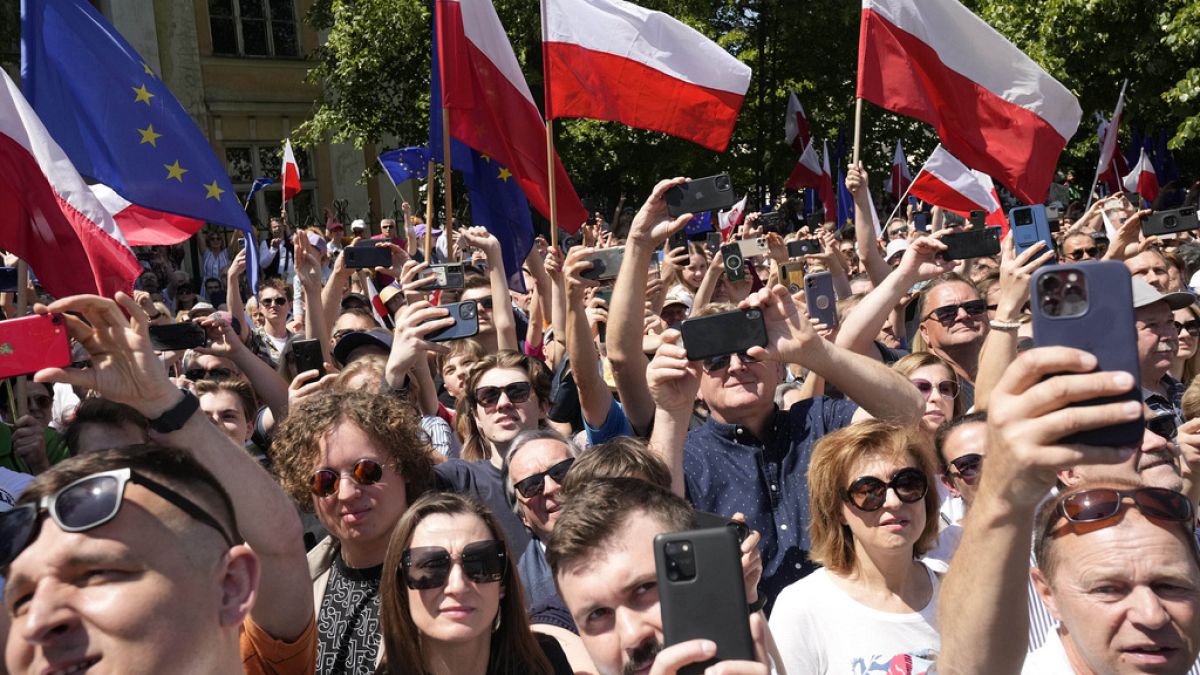Campaigns begin as anxieties in Poland are rising over the presence of Russian Wagner mercenaries near the border.
Poland is set to hold parliamentary elections on 15 October, kicking off an electoral campaign that has already been unofficially underway for months.
Polls show the ruling Law and Justice party (PiS), in government since 2015, is currently the most popular party, but it is likely to fall short of an outright majority in parliament.
It holds a small lead over a centrist bloc, the Civic Coalition, headed by Donald Tusk, a former Polish prime minister and ex-president of the European Council.
Support for Tusk's party has grown in past months but mostly at the expense of other opposition parties.
The vote - which will see lawmakers elected for a four-year term - is being shaped by the Russian invasion of Ukraine, which sparked tensions across the region.
Fears of a provocation on Poland's borders have risen, following the arrival of thousands of mercenaries from the Russian Wagner group on Belarusian soil.
Last week, a small contingent of around 100 Wagner fighters moved towards the Suwalki Gap land corridor, which experts could be captured to "cut off" NATO allies in the Baltics from Poland.
Warsaw in response beefed up its border security, with the ruling PiS wanting to present themselves as strong on defence.
However, a Polish security expert told Lithuania's public broadcaster LRT worries about Russian provocations - echoed by Poland's Prime Minister Mateusz Morawiecki - were “bizarre and absurd”, suggesting those in power were "trying to use the situation to their advantage" in view of the upcoming election.
Tensions have also grown with Poland's ally Ukraine, though it has so far been one of the country's most steadfast supporters.
A diplomatic spat was sparked last week after Warsaw called Kyiv "ungrateful" amid a squabble over grain imports.
PiS has taken a more confrontational stance with Ukraine as the far-right political group Confederation, which has fomented anti-Ukrainian sentiment, has risen in the opinion polls.
Millions of Ukrainian refugees have fled through Poland since Russian tanks rolled across the border in February 2022 - with the latest figures showing around a million remain there still.
While Poles have been praised for their welcoming reception, there are concerns their presence is putting a strain on local resources, which the small - yet increasingly influential - far-right is capitalising on.
PiS has gained popularity with many Poles for its conservative values and increase in state support for the elderly and families with children.
Early in its first term it introduced a monthly cash payment of 500 zlotys (€112) per month for each child under 18.
President Duda, who is aligned with the party, on Monday signed legislation raising that monthly payment to 800 zlotys (€179) per month, starting next January.
In July, Poland passed a controversial "Russian influence" law that critics warned could be used to target the opposition.
When it takes effect, it will create a powerful committee of experts who can investigate alleged Russian interference in Poland and name politicians who allegedly allow it.
The committee could then bar those concerned from holding public positions.
PiS has been widely condemned for veering towards authoritarianism, undermining the independence of the judiciary, media and eroding democratic norms.
